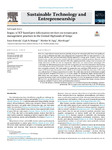Impact of ICT-based pest information services on tomato pest management practices in the Central Highlands of Kenya

View/
Date
2023Author
Mwenda, Evans
Muange, Elijah N.
Ngigi, Marther W.
Kosgei, Alice
Metadata
Show full item recordAbstract
Pests are a major threat to tomato producers globally, owing to the substantial yield losses, low-quality produce, and low profitability that they cause. Integrated pest management (IPM) has been promoted as a sustainable, effective, safe, and environmentally friendly approach to manage pests. However, many tomato
farmers in low- and medium-income countries still rely exclusively on synthetic pesticides. Moreover, many
farmers rarely observe pre-harvest intervals (PHI) after applying pesticides, owing to lack of accurate and
timely information on IPM and safe use of pesticides. Information and communication technologies (ICT)
could bridge the information gaps on pests and their management and have been deployed in disseminating
varied information to farmers worldwide. However, the effect of ICT on pest management practices has not
been adequately evaluated. This study applies the propensity score matching (PSM) method to assess the
impact of ICT-based pest information services (IBPIS) on the adoption of IPM and observance of PHI, using
data collected from 170 Kenyan tomato farmers in 2021. The results show that 48.2% of the farmers adopted
at least one IBPIS. Adoption of IPM was at 51.2% of the sample and significantly higher among adopters of
IBPIS (64.6%) than non-adopters (38.6%). About 49% of the farmers observed PHI. Further, adopting IBPIS
increased the number of pest control methods used by farmers by 22.8%, the proportion of farmers adopting
IPM by 21.2%, and the observance of PHI by 61.7%. The study recommends that farmer advisory services
incorporate multiple ICT tools to deliver pest information to farmers.
